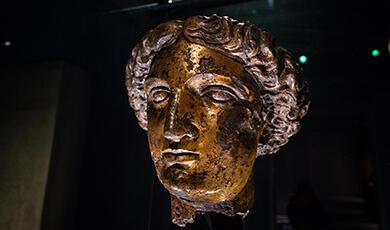The Great God Pan: Lord of the Wild
Share
- Details
- Text
- Audio
- Downloads
- Extra Reading
Pan started as a shepherds’ god in a wild and backward area of Greece, but became one of the best-known in the Greek and Roman world. This was partly because the leading city of Athens imported him as a saviour, and partly because he came to represent the freedom, peace and simplicity of the countryside to urban people. He was the most earthy of Greek deities, summing up wild nature in its beauty but also its danger. He was a god of both liberation and menace, and this lecture faces up to him as both.
Download Text
The Great God Pan
Professor Ronald Hutton
17 September 2025
Any study of Pan needs to reckon with his tremendous popularity in modern times. He was the pagan god who featured most often in English poetry between 1800 and 1940, being viewed both as the patron of the vanishing countryside and as an icon of sexual liberation. This presents a historian with something of a paradox, because he was the least important of the major ancient Greek gods: in standard scholarly works on Greek religion and mythology he is either absent or given at most a couple of paragraphs. One of the authors of these works, Ken Dowden, summed him up as ‘a Citroen 2CV among Greek gods.’ Moreover he arrived late on the wider scene of the ancient world: there are no absolutely certain appearances of him in any surviving Greek literature or art dating from before 500 BCE.
This is because he came from a part of Greece and a bunch of people who couldn’t speak for themselves: he was the god of the shepherds of Arcadia, the interior of the north-western Peloponnese, the fat southern peninsula of Greece. It was completely mountainous, in a world in which civilised people lived in cultivated lowlands and cities, and its people were wild and illiterate hillbillies, living by herding goats and sheep. The rest of Greece viewed it, in modern terms, as a mixture of Arkansas and Transylvania. Pan was its god, half-goat himself, living in the mountain pastures, playing shepherds’ pipes and looking after the people and their flocks. His name derives from the old Greek word for a herdsman. Even his strangest characteristic, his ability to drive humans and animals into ‘panic’, is related to the tendency of large flocks of sheep and goats to stampede without apparent reason.
A herders’ god in Arcadia was precisely the sort of deity least likely to make an impact on a Greek religion and mythology recorded by authors and artists living in cities. That he got there at all may probably be ascribed to two different phenomena. One is that in 490 BCE the citizens of Athens adopted him, giving him a temple and festival. They did so because they believed that he had helped them defeat an invasion from the mighty Persian empire earlier that year. The messenger they had sent to beg help from another powerful city (unavailingly) reported that as he had run down the border of Arcadia, Pan had appeared to him to offer his aid. When the battle came the centre of the Persian army had collapsed in panic, and the Athenians believed that this was the god’s work.
Once Pan got an important Athenian cult, other Greeks found the second and bigger use for him. By this time, the fifth century BCE, Greek city-dwellers were starting to enjoy trips into the countryside for its beauty and peace. They were likewise starting to admire country living for its simplicity and freedom. The Arcadians represented both to an extreme degree, and their god was now taken to stand for everything their lifestyle permitted and the city did not. There was accordingly now an explosion of interest in Pan, in which his main function was as the god of the wild, the most earthy of all Greek male deities and standing for the world of nature. He had an especially close relationship with the animals, plants and humans of the mountains, and with their divine beings, the nymphs. He was also wild in the other sense of the word, standing for the freedom to wander and enjoy oneself at will. He expressed the joy of living and the taking of pleasure.
He was now given a divine pedigree, though the Greeks could not decide if he was one of the oldest of gods, the son of Time itself, or one of the youngest, the son of the messenger god Hermes. He became especially associated with caves, as natural refuges and also boundaries between the apparent world and the underworld. The earliest literary works to deal with him – Sophocles’s play Ajax and the Homeric Hymn to Pan - are both invocations of him. The hymn added a new association for him, with hunters, another marginal kind of people involved with the natural world. It gave him a new myth, that when he was born his mother was repelled by his half-beast appearance, but his father Hermes delighted in his boisterous cheerfulness, and so did the other gods. The story also made a pun that was to be very influential, by relating his name, which as said means a herdsman, to the Greek word for ‘everything’, which sounds almost identical. As yet, the Greek world had no standard picture of him, painting and carving him as a dancing goat or goat-headed man or beautiful horned youth. By the fourth century things settled down and his enduring image was created, of a man’s face and torso, goat’s legs, ears and beard, and slanting pipes.
After that nothing much changed for the rest of the ancient world. It is clear that for the Greeks pilgrimages to rural shrines of Pan were liberating country holidays, especially for women, whose lives were more restricted. Athenian priests of him wore goat masks and skins, and while rich people offered the best goat in a herd to him in sacrifice, the poorer offered bread, milk, fruit or honey. The Romans had their own goat-god of herdsmen, Faunus, and they merged him with Pan, giving the resulting hybrid a retinue of smaller half-human, half-goat figures called fauns. Under the Roman Empire writers showed Pan in many forms. The poet Ovid made him a would-be rapist, of a nymph called Syrinx, who turns into a bunch of reeds to escape, and forms the material for his pipes. The satirist Lucian portrayed him as an embodiment of toxic masculinity. To late antique Greek writers he was a heroic figure, helping the other gods defeat their enemies, the Titans. One novelist, Longus, restored him to being a benevolent protector of shepherds and another, Apuleius, made him a wise old giver of advice. The most remarkable story told about him was by the scholar Plutarch, who recounted how sailors near a Greek island heard a voice proclaiming from it that the great god Pan was dead. This tale is however unique to Plutarch, its historical details do not check out and the puns in it indicate that it was intended as a sophisticated joke. There is not the slightest sign that anybody took it seriously.
This closes the ancient dossier. It is enough to mark Pan out as a vividly depicted and unique deity, and to provide a fund of images and ideas for posterity. It still did not make him into more than a comparatively minor ancient god, and it was modernity which was to transform him into a star. However, the ancient texts still matter. There are quite a number, they are memorable, and they provided the indispensable basis for what was to come.
© Professor Ronald Hutton 2025
References and Further Reading
Borgeaud, Philippe. The cult of Pan in ancient Greece. 1988.
Boardman, John. The great god Pan. 1997.
Robichaud, Paul. Pan. 2021.
Borgeaud, Philippe. The cult of Pan in ancient Greece. 1988.
Boardman, John. The great god Pan. 1997.
Robichaud, Paul. Pan. 2021.
This event was on Wed, 17 Sep 2025
Support Gresham
Gresham College has offered an outstanding education to the public free of charge for over 400 years. Today, Gresham College plays an important role in fostering a love of learning and a greater understanding of ourselves and the world around us. Your donation will help to widen our reach and to broaden our audience, allowing more people to benefit from a high-quality education from some of the brightest minds.


 Login
Login






